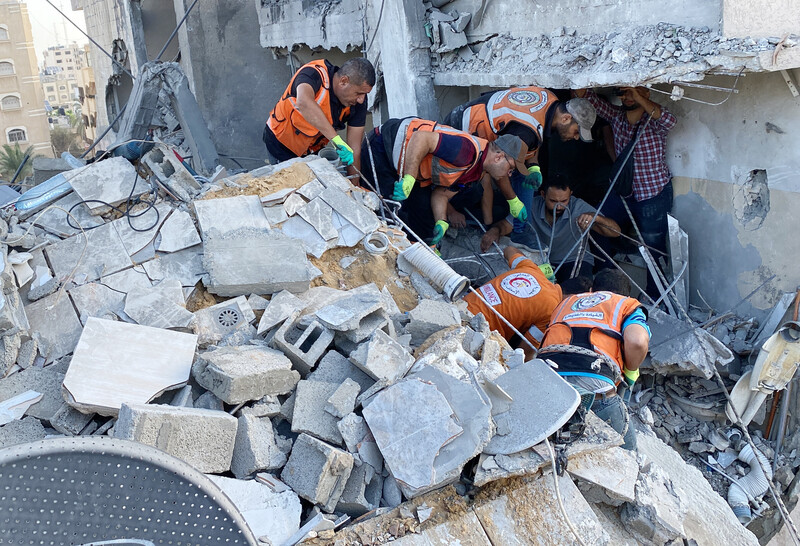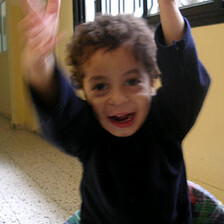The Electronic Intifada 30 December 2024

Emergency crews search for survivors after an airstrike on a home in Gaza City in September.
APA imagesThis happened at the beginning of October at the beginning of Israel’s re-invasion of the Jabaliya refugee camp.
The assault forced a large number of residents to flee. Most headed westward to areas in Gaza City considered relatively safer – even though everyone knows that nowhere is safe with an enemy that has proven over 14 months and many decades that it is ready to bomb anything and kill anyone, anywhere and at any time.
It was a day that had otherwise passed peacefully in our area of Gaza City, al-Jalaa. I had joined my brother, cousin and a group of neighbors and friends in the small garden of my friend Baha’s home, close to my house.
Baha’s garden was a regular meeting spot, where we would light a fire for warmth and heat canned beans for dinner while chatting and passing the time.
Earlier that afternoon, the al-Ghomri family had taken refuge in a nearby house, planning to stay with relatives who lived there for a few days before heading south in search of safety with a larger group of displaced families.
But the Israeli forces acted first. During our gathering in the evening, the military launched an intense bombardment in the area; it also struck the nearby house.
Everyone rushed to try to rescue people. I tried to call for help, but the bombardment was too intense and ambulances were at first held back. As we searched for the wounded and the dead, the ambulances that managed to get through prioritized those with moderate to severe injuries for transport to al-Ahli Hospital, while minor injuries were treated on-site by volunteers.
The dead were left to be counted and later moved to morgues.
Alive
In the chaos, we found a young woman, Aisha al-Ghomri. The force of the explosion had thrown her into the street, where she had landed on the broken sidewalk. Everyone assumed she was dead.
I was asked to carry her and place her among the other corpses to be removed later, either by car or donkey-pulled carts, as ambulance capacity was overwhelmed. However, as I lifted her with the help of my brother, I felt a faint breath.
We carried her to the hospital ourselves. It took some time. Along the way, I tried to sprinkle water on her face to get her to respond, but there was no reaction. Only her faint breathing betrayed continued life; her body remained completely still.
When we finally arrived, she was treated immediately. One of her injured relatives, who had thought she was dead, recognized her and broke down, saying he believed she had been blown to bits.
When I asked the medic about her condition, he told me that she had suffered a fractured spine and spinal cord damage. She was completely paralyzed. The doctor thanked me for saving her, but also told me she could only move her eyes.
And as I looked at her, I imagined her reproaching me in silence: “I wish you had left me to die with my family. Now I face a new kind of suffering.”
The night at the hospital passed quickly, and by morning I returned home with my brother to our anxious family.
For love of life
I initially felt like a hero, having saved a life. But that feeling soon faded when I visited the hospital a week later to check on a relative.
I asked about Aisha and was told that the Red Cross had transferred her to al-Aqsa Martyrs Hospital in the south, as al-Ahli lacked adequate resources. Once the Rafah crossing opened she would be sent abroad for treatment.
I had hoped to see her improved and hear her thank me. But she was no longer there. I pray for her recovery and hope she receives surgery that might improve her condition.
Every time someone tells me it would have been better for her to die, I feel helpless. I wonder if she is grateful that I saved her or if she silently wishes for death. Whenever I imagine a person unable to move anything but their eyes, I feel a deep sadness for her.
I woke up several times in the morning, trying to imagine her situation, but I couldn’t endure my thoughts even for a few minutes. How can someone spend hours, days and weeks lying in a hospital bed, staring at the ceiling, unable even to scratch their head?
This is what Israel has done to her – a young woman, just 23, in the prime of her life, who should have been working or studying or doing anything at all.
This is the harsh, painful reality we live as Israel’s genocide continues, unchecked and increasingly unnoticed.
My wife constantly reminds me that saving her was an act of hope and love for life. She tells me that Aisha’s condition doesn’t mean the end of hope, as others have faced similar hardships and overcome them with medical care and psychological and social support.
Maybe she is right. Now, I want to be a voice for survivors like Aisha. Perhaps this will inspire more support for them and redirect attention to what we need – protection from Israel’s genocidal aggression and the opening of borders to allow the wounded access to treatment.
I hope Aisha recovers. I hope to meet her some day to give her my regards and remind her that I saved her in an act of hope and for love of life.
Montaser Hani is a writer from Gaza.


